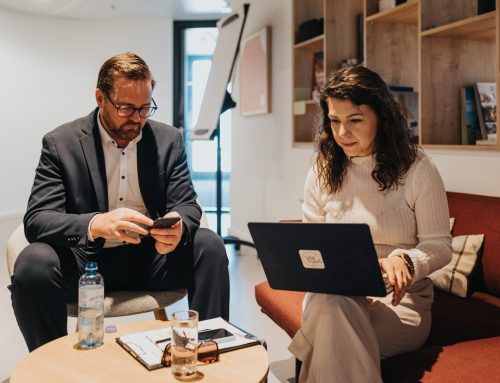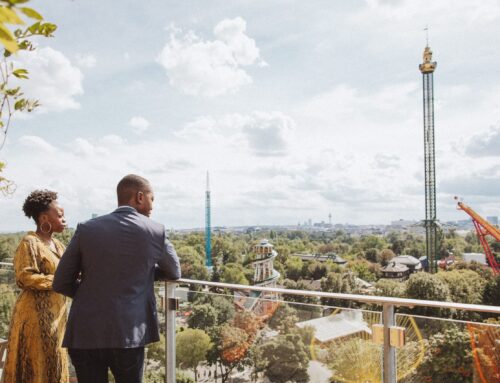Leading a business in November 2020 is a bit like sailing a boat across the Atlantic. You have a rough idea of the weather that awaits you in the next few days but cannot forecast all storms, obstacles and set-backs that you will encounter along the way.
We are living in pressure cooker times where many of the things we took for granted no longer hold true and following a neatly mapped out plan is no longer possible. In addition, eight months of Zoom have left people with Zoom fatigue and worries about health, family members or financial security take their toll.
Covid, Brexit, the US elections and global warming add to the enormous uncertainty and ambiguity. In addition technology and especially AI are at a stage where they will enter exponential growth, which means that we will live in an entirely different world in a few years from now that our linear minds just cannot picture yet.
In a world where the 10 biggest companies generate more revenues than many countries, today´s leaders also carry an additional responsibility to either contribute to the further destruction of the planet or to work together with governments, competitors and academia to tackle global challenges such as climate change that impact humankind.
On the individual level all of this together creates increased pressure to produce more in shorter time frames and with less resources, plus a fear that one´s head is on the line in case of mistakes. Plus it is lonely at the top.
Leading in the 21st century requires out-of-the-box-thinking and the ability to operate in unknown territory. There is a need for courageous leaders that are comfortable with the uncertainty and can use this space of not knowing to their advantage. Leaders who know that every innovation and “aha” moment come from the space of not knowing. We need emotionally intelligent leaders who remain calm, centred and compassionate when the going gets tough. We need leaders who act with integrity and can control their impulses to stay true to their values when under pressure. We need leaders that are not just driven by profit but take sustainable decisions for the greater benefit of all.
Traditional Leadership Training Programmes Fall Short When It Comes To Mastering Uncertainty
All of this is of course old news. The importance for leaders to master uncertainty and pressure is not a new phenomenon but has been a key requirement for leaders since the financial crisis. A lot of leadership books and articles talk about the importance of HR educating leaders to be more comfortable with uncertainty, speak of the necessity of having agile leaders and the importance of unfreezing leaders. Much fewer is written on how to actually achieve this in daily life. When it comes to preparing leaders for mastering uncertainty and dealing with pressure, traditional leadership training programmes have two key flaws:
- They are based on the questionable assumption that we are conscious human beings that make conscious choices.
- They ignore what Daniel Goleman calls the “amygdala hi-jack”, which is our inbuilt physical reaction to uncertainty, change and pressure.
As a result leaders are still struggling with uncertainty even though it is the new normal and undoubtedly here to stay.
Our Boardrooms Are Not As Conscious As We Think They Are
We tend to assume that we are conscious human beings that make conscious leadership decisions, but that is unfortunately not always the reality in our boardrooms and daily lives. According to Harvard Professor Ellen Langer, “most of us are on autopilot virtually almost all of the time.” Research also says, approximately 40 per cent of what we do on a daily basis is habitual and automatic, meaning that individuals do not make conscious choices about their behaviour. Through the course of the day hundreds of habitual patterns and reactions are going ‘online’ and ‘off-line’ without one’s consciously noticing it. It takes awareness of what one is doing in the present moment and conscious effort to change existing behaviour.
In addition, as some of you are probably well aware, the current environment has a tendency to trip up our nervous system when we are faced with change, pressure or uncertainty. Whenever our amygdala (the survival function of the brain) is triggered, we are reactive and the focus is on short-term, impulse and speedy decisions without being able to take long-term consequences into consideration. There is a tendency to jump to conclusions, to become closed or defensive, to have a tunnel vision and to collapse the creative rollercoaster prematurely. At that moment we have no space in our minds and if there is no space, there is no choice and we have no options. The behaviour is automatic, habitual and reactive.
The majority of leaders have good values and intentions – yet so many good and well-trained leaders fall short of their potential or lack integrity when the going gets tough and leaders feel their heads are on the line. It is not because they have “bad characters” per se or consciously intended to deceive or harm their corporations, employees, peers, customers or communities. They fall short because their amygdala is “hi-jacking” their executive brain, the part of our brain responsible for concentrated focus, strategic and long-term thinking, impulse control and positive outlook. This makes them do things that are not very smart and might have negative consequences for themselves, the people they are leading as well as their company. In the worst case it also affects the community and industry they operate in as seen during the financial crisis. Once the amygdala is in charge their best intentions and values can get obscured and a “me first” attitude prevails. The result is often a mismatch between what a leader “preaches” and his/her actual demonstrated behaviour. This tends to lead to a loss in trust and credibility.
I have for example, worked with a CEO who had amazing values and was very passionate about building a culture of trust, innovation, empowerment and open discussion. Yet whenever he felt under pressure, he had a tendency to become closed and defensive. In those moments he would shut people down. As he had a very impressive background and people looked up to him, this led to people feeling scared when they had to discuss their ideas with him. They often procrastinated and tried to hide mistakes they made and in many ways he created the exact opposite culture of what he had intended.
From the iconic Samaritan study we also know that the biggest indicator for unkind, uncaring and uncompassionate behaviour for otherwise kind and caring individuals is a perceived lack of time. This is quite worrying as in today´s 24/7 always on culture almost every leader I meet complains about being too busy and having trouble carving out time and space to focus.
The Case For Mindful Leadership Training
Mindful leadership training comes in where traditional training programmes fall short.
According to contemplative neuroscience, mindfulness practice has the power to alter our brain structure for the better. Professor Richard Davidson, one of the leading neuroscientists researching the effects of mindfulness training on the brain, suggests that mindfulness training can change our in-built response to uncertainty, change and pressure by strengthening our executive brain and increasing the white matter between the amygdala and the executive brain. By dampening down the amygdala, the executive brain is able to quiet signals associated with negative emotions. As a result we get triggered less often and when we do, we gain the ability to step back, become aware of what is happening and as such can make a choice to respond differently this time. Recent research also suggests that mindfulness training among many other benefits strengthens the ability to focus, supports decision-making and strategy and increases authenticity, EQ and compassion.
Culture Starts From The Top
A leader´s shadow is very long and culture usually starts from the top. As such the starting point for any leader, before they do anything else, must be to learn how to train their brain and “hack” their nervous system in order to access their full leadership potential in all situations and remain calm, focused and compassionate even under pressure or when faced with change and uncertainty. Managing our nervous system creates space in our mind, which gives us conscious choices and allows us to respond rather than habitually react.
In my experience and from what neuroscience tells us, taking our seat to meditate is one of the most effective ways of “hacking” our nervous system in the long run. We take care of our bodies every day by brushing our teeth, taking a shower and some of us try to have a healthy diet. In a similar way it is crucial for a leader to take care of their minds on a daily basis.
Mindfulness also teaches leaders specific skills for self-managing in terms of helping them manage their own nervous system in the present moment, working with Mindfulness of breath and bodily sensations to calm down their nervous system or remain more alert and present in any given situation.
While mindfulness training is no longer exotic in many workplaces, more often than not the focus is mostly on mindfulness for the troops, focused on mental health, stress management or resilience. Middle managers often complain about the pressure from the top and consequently pass it on to their teams. Employee wellbeing is often directly related to the leadership style at the top. As such training leaders in mindfulness is more instrumental to cultural change and workforce wellbeing than only offering mindfulness to those crumbling under pressure at the bottom of an organisation.
A mindful leader is not just a leader who meditates but a leader who manages from the inside out and in the service of others. Integrating Mindfulness into traditional leadership training programmes infuses them with awareness and presence, which enables leaders to change unconscious habitual patterns and enables them to have a different impact on the people they lead as well as the world around them.

Palma Michel works at the intersection of high performance and peak wellbeing. She advises organisations and individuals on successfully navigating the space of not knowing. Palma is a sought-after mindful leadership advisor, transformational coach, meditation & mindfulness teacher and public speaker. As the host of the Explorer´s Mind Podcast she interviews people who have achieved impossible dreams, expanded their minds or overcome insurmountable obstacles and create positive impact Her global clients include CEOs, founders, high networth individuals, philanthropists, start-ups, universities and multinationals. She also supports many clients who have been diagnosed with life threatening illnesses or burnout. Palma strongly believes in giving back and has been supporting a number of impact accelerators on a pro bono basis. Her volunteering work with the mental health charity Mind and St Joseph’s hospice gives her a unique perspective on living life right now with purpose and meaning. Palma´s first book The Authority Guide To Mindful Leadership offers simple evidence-based techniques to manage yourself and others and effect positive change during times of uncertainty. She is also supporting a variety of research projects that investigate the effects of meditation and peak states on overall wellbeing and mental health. Palma´s meditations are featured on two of the most popular meditation apps Muse and Insight Timer.






